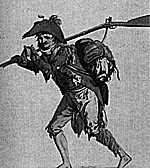 >
Les Morts de Quiberon
>
Les Morts de Quiberon
Hopes that the negotiations at La Jaunaye would indeed signal the end of the insurrection in the Vendee have been dashed against the cliffs of the Quiberon Peninsula. The Comte D’Artois has reawakened the Royalist rebels by sending an expedition funded by the English, but he did not count on meeting such an opponent as General Lazare Hoche in command of the Republican forces in the West. D’Artois and his Agents had forced Charette to resume hostilities and once again raise the banner of the Catholic and Royalist Army. Information from prisoners would seem to indicate that he planned to land himself at the head of an Army.
General Hoche however cleverly did not adopt the tactic of violent suppression followed by his predecessors and ordered his troops to strictly observe the conditions of the agreement at La Jaunaye, especially concerning religious freedom. As a result only a small number of Vendeans rallied to Charettes banner, and many of those were without a great deal of enthusiasm.
The Royalist expedition was transported by an English Fleet commanded by Admiral Warren, with 3 - 74 gun ships of the line, 6 Frigates, and up to 60 transport ships. A landing was made on Carnac beach at the foot of the Quiberon Peninsula (between Nantes and L’Orient) by 4000 men. The plan seems to have been to meet up with rebel forces in France, arm and equip them, and then joined by D’Artois himself to march on Paris. Certainly 80000 muskets, 80 Cannon, and Uniforms and equipment for 60000 men have been recovered. The Comtes de Puisaye, and d’Hervilly commanding the Emigre forces were reluctant to advance without support despite urgings from Cadoudal and this allowed General Hoche to clear rebel troops in the immediate area from the towns of Auray, Meudon, and Landevan. Instead the Emigres moved back down the peninsula and occupied the Fort at Pentievre, capturing the republican garrison but in so doing shutting themselves up on the peninsula. Further troops were landed in support but Hoche had moved onto the offensive taking up a strong position at Sainte Barbe.
General Hoche’s opportunity came on 3 Thermidor (21st July) when with heavy seas keeping the English Fleet out to sea he moved 3 columns along the cliff tops in the dark and under the cover of the storm behind the Emigre positions from where he was able to attack and completely rout the invaders. Whilst some 748 Emigre’s were shot at Vannes for their part in the invasion the Choan rebels captured were cleverly pardoned thereby further weakening the resolve of remaining rebels in the Vendee. Charette is still at large but it would seem without support. Certainly the Comte D’Artois seems to have preferred discretion to valour and was notable for his absence.
La chute de valeur des Assignats
From shortages in bread the talk in Paris is of raging inflation and in fall in value of the Assignat. Assignats, the paper money issued by the Convention but without the backing of Gold have lost 68% of their value this year alone. Confidence in the currency has been lost as more and more assignats have been printed to meet rising prices. Rumours have been circulating Paris that the problem has been caused by forgeries flooded onto the market by William Pitt and his rogues in London. Whether true or not it certainly suits the convention to encourage these rumours especially now the news of the Quiberon invasion is out. A table printed in the Courrier Francais shows that “1 paire de sabots” (a pair of clogs), 8 sols in 1790 now cost 15 livres, and “1 Boisseau de Haricots”, (a bushel of French Beans), 4 livres in 1790 now costs 120 livres.
Espagne
Following the advance of Republican forces to the Ebro, and the capture of Vittoria and Bilbao, the Spanish have dropped out of the coalition against France and signed the Treaty of Basel, joining Holland and Prussia in making peace with the Republic. Credit for this goes to General Moncey who led the offensive. He has now agreed to pull back his troops to the borders with Spain which has in turn ceded part of Sainte Domingue to France.
Victoire a Dusseldorf
The Committee of Public safety has rejected Austrian armistice terms, and the Army of the Sambre et Meuse under General Jourdan has crossed the Rhine. With great boldness the troops in an assault led by Generals Championnet and Legrand have captured 200 enemy guns and although heavily outnumbered have taken Dusseldorf. General Jourdan now awaits support from General Pichegru to advance towards Vienna and force the Austrians to accept the revolution.
Vive la republique!
De Breuc
Back to Table of Contents -- First Empire #25
Back to First Empire List of Issues
Back to MagWeb Master Magazine List
© Copyright 1997 by First Empire.
This article appears in MagWeb (Magazine Web) on the Internet World Wide Web. Other military history articles and gaming articles are available at http://www.magweb.com